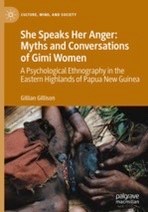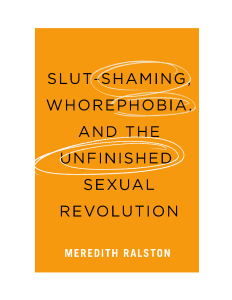Book It!
If you have published a book within the past six months or have one coming out in the near future, please e-mail the editor a high-resolution .jpg of the cover, along with a 50-word-or-less description of the book and its publication date: magazine@trinity.utoronto.ca
BROOKE CLARK ’95
Sensuous, scandalous, satirical, tender, this book is composed of free adaptations of Latin and Greek epigrams. Urbanities is a journey across time, and along the way we meet characters—terrible poets, rip-off novelists, attention-seekers all—proof that not much has changed in the cutthroat literary world from then to now. (Fitzhenry & Whiteside Limited)
GILLIAN GILLISON, Trinity Fellow
She Speaks Her Anger: Myths and Conversations of Gimi Women: A Psychological Ethnography in the Eastern Highlands of Papua New Guinea offers a nuanced psychological ethnography grounded in the correspondences between Gimi myths and rituals, and Freud’s theory of the Primal Crime. The book critiques current anthropological discourses on mythopoeia, kinship, gender, personhood and human sociality, and provides new insights into the contested relationship between men’s and women’s understandings of the world they share. (Palgrave Macmillan)
CATHERINE INGLIS ’95
For some kids, ways they can help eliminate racial injustice might be hard to see. After all, they are taught that people in society are all equal under the law. So why, then, does racial conflict still exist? And what can they as individuals do about it right now? Written for an audience of nine-to-15-year-olds, White Privilege: Deal with it in all fairness provides scenarios, quizzes and Q&As that develop readers’ understanding of the concept of white privilege. The topic is approached from three points of view: those who are privileged, those who identify as racialized and those who want to be allies. (Lorimer)
CAROL MAJOR
The Asparagus Wars is a memoir about battles waged against a terminal illness and a mother’s struggle to comprehend the battlefield in its wake. While some family members wage war against her daughter’s terminal illness with natural therapies, and doctors fight on using the latest developments in medical science, she longs to take her daughter to Paris instead, the city that inspired the young woman’s writing and art. (ES-Press)
MARGARET MACMILLAN, former Trinity Provost
In War: How Conflict Shaped Us, MacMillan looks at the ways in which war has influenced human society and how, in turn, changes in political organization, technology or ideologies have affected how and why we fight. Drawing on lessons from wars throughout the past, from classical history to the present day, MacMillan reveals the many faces of war—the way it has determined our past, our future, our views of the world, and our very conception of ourselves. (Random House)
CHRIS McNAUGHT ’68; LLB ’73
In Dùn Phris: A Gathering, lawyer James Kirkpatrick leaves America to find his Scottish roots, and in Dumfriesshire walks into the arms and charms of DCI Persephone Rodriguez. James’ new hometown has ghosts, too: After the Battle of the Atlantic, within sight of the Bloody Foreland, every surrendered U-boat was sunk by naval gunnery. What could this have to do with the disappearance of a young nursing auxiliary more than 70 years ago? (Pegasus/Vanguard Press)
MEREDITH RALSTON ’84
In her new book, Slut-Shaming, Whorephobia, and the Unfinished Sexual Revolution, author, professor and documentarian Ralston examines the common denominators between the #MeToo movement, the myths of rape culture, and the pleasure gap between men and women to reveal the ways that sexually liberated women threaten the traditional patriarchy. Weaving in history, pop culture, philosophy, interviews with sex workers, and anecdotes, Ralston shows how women will achieve sexual equality only when the sexual double standard and good girl/bad girl binary are eliminated, and women viewed by society as “whores” are destigmatized. (McGill-Queen’s University Press)
As published in the Living Trinity Electronic Newsletter November 2021








Sorry, comments are closed for this post.